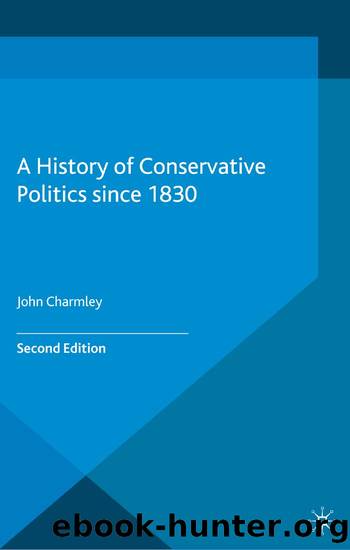A History of Conservative Politics Since 1830 by John Charmley

Author:John Charmley
Language: eng
Format: epub
ISBN: 9780333929735
Publisher: Macmillan Education UK
11 A Conservative Consensus?
Despite Labour’s propaganda – and the disappointment of later Conservatives – the Churchill years marked no great change in, but rather a reinforcement of, the prevailing consensus. Butler’s strategy in opposition had been aimed at trying to convince the electorate that the Conservatives could preside over a Welfare State with high public spending, and that there would be no return to the austerity of the 1930s. The Conservatives had fought a campaign which emphasised this theme; as Churchill put it: the nation needed a rest ‘if only to allow for Socialist legislation to reach its full fruition’.1 Nor did the election result suggest that the nation was anxious for any change. More votes had been cast for Labour than for the Conservatives (13,948,605 as opposed to 13,717,538),2 and the Conservatives had a slender majority of 17 seats. If the campaign and the result suggested that a period of consolidation was in order, Churchill was only too happy to oblige.
From the very start, Churchill strove to be a national rather than a party leader. Had the Liberal leader, Clement Davies, not been forced by his own party to turn down Churchill’s offer of the Ministry of Education, then the government would have been a ‘Conservative-Liberal’ one, and as it was it contained in its ranks many who were not, in political origin, Conservatives. There were the old ‘National Liberals’, who had been formally integrated into the party on 1947 under the Woolton-Teviot agreement, and these included the Lord Chancellor, Lord Simonds, as well as the Minister of Fuel and Power, Gwilym Lloyd-George; other members of the 18-strong Liberal contingent received minor office. In addition to this group, there was another intake who might be characterised as Churchill’s cronies: these included Lords Cherwell, Ismay, Alexander and Leathers; the first three all initially refused the offer of a post in the government, but acceded to Churchill’s pressure. The number in this group would have been even greater had not Lords Asquith, Waverley and Portal not all managed to resist the Prime Minister’s blandishments. One recent commentator has called the government ‘the least recognizably Conservative in history’.3
If the make-up of the government indicated its non-partisan nature, then so too did some of the key appointments. It had been widely expected that Oliver Lyttelton would go to the Exchequer, but Churchill appointed Rab Butler instead, telling him: ‘Oliver … is absolutely tainted with the City. We couldn’t have a Chancellor in the House of Commons who was a City Man.’4 Butler struck the head of the Economic Sector of the Cabinet Office as ‘almost pathetically anxious to stand in well with his officials’, but expected that he would show ‘enough firmness when it was necessary’ and ‘enough ability to follow most of the arguments’.5 If Butler’s appointment was a sop to Labour, then the decision to place another of Churchill’s cronies, Sir Walter Monckton, at the Ministry of Labour, was an act of outright appeasement. Monckton was professionally and personally oleaginous, totally
Download
This site does not store any files on its server. We only index and link to content provided by other sites. Please contact the content providers to delete copyright contents if any and email us, we'll remove relevant links or contents immediately.
| Elections & Political Process | Ideologies & Doctrines |
| International & World Politics | Political Science |
| Public Affairs & Policy | Specific Topics |
| United States |
The Secret History by Donna Tartt(18216)
The Social Justice Warrior Handbook by Lisa De Pasquale(11960)
Thirteen Reasons Why by Jay Asher(8468)
This Is How You Lose Her by Junot Diaz(6458)
Weapons of Math Destruction by Cathy O'Neil(5848)
Zero to One by Peter Thiel(5505)
Beartown by Fredrik Backman(5371)
The Myth of the Strong Leader by Archie Brown(5246)
The Fire Next Time by James Baldwin(5027)
How Democracies Die by Steven Levitsky & Daniel Ziblatt(4969)
Promise Me, Dad by Joe Biden(4915)
Stone's Rules by Roger Stone(4870)
100 Deadly Skills by Clint Emerson(4699)
A Higher Loyalty: Truth, Lies, and Leadership by James Comey(4563)
Rise and Kill First by Ronen Bergman(4551)
Secrecy World by Jake Bernstein(4404)
The David Icke Guide to the Global Conspiracy (and how to end it) by David Icke(4390)
The Farm by Tom Rob Smith(4331)
The Doomsday Machine by Daniel Ellsberg(4252)
